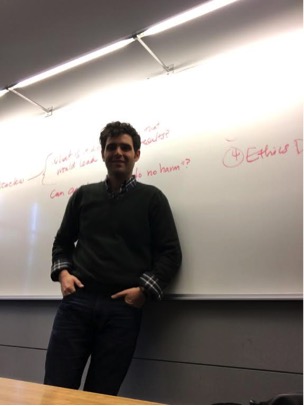Bill Farley, graduated from UMB in 2012
PhD candidate in Anthropology at University of Connecticut
1. What is your position now; what do you do on a day-to-day basis?
Since graduating from UMB in 2012 I have been a graduate student at the University of Connecticut. I’m now in my last year so I’m a “doctoral candidate” – otherwise known as ABD. Let me start off with a bit of advice though – I got accepted to a PhD program before I finished my thesis and spent my first semester at UCONN while I wrote my MA. That was so stressful – finish your MA BEFORE you go to a doctoral program, if you can! Thanks to my experiences with teaching at UMB, including TAing for a field school, I moved into teaching my own classes pretty quickly at UCONN. Teaching is my passion and I’ve sought every opportunity to do more of it as I have gone along. So much so that I now usually teach three courses a semester in addition to field school and intersession courses. I teach at UCONN as a part of my assistantship, but I also teach as an adjunct instructor at the University of Hartford and Connecticut College. I’m very happy to say that I will be starting as an Assistant Professor at Southern Connecticut State University in the Fall!
2. What is the most interesting project (field, lab, academic, or community) that you have worked on recently?
My research is focused on early 17th-century sites. For my diss, I’m comparing a 1630s Pequot village in Mystic, CT, to a 1630s-40s Puritan house in Marshfield, MA. These projects have given me the opportunity to work on ongoing field and lab projects. I also regularly collaborate with a number of communities including the Native American community in CT, CRM firms, and even avocational metal detectorists. I feel extremely lucky to have the opportunity to work on these two rare and exciting sites, and they have opened up some amazing opportunities to explore cultural change and continuity during the earliest years of Euro- and Native American interactions.
3. What is one thing that you remember specifically about your time at UMass?
I will never forget my first class at UMB. I was terrified and felt very sure that I did not belong with my new and obviously brilliant classmates. So I’m sitting in theory with Steve Silliman who started the class by going through a list of famous archaeological theorists, asking who we were familiar with in order to assess where we stood in our training. The only name I even recognized was Binford. This experience did not change my impression that I was woefully unprepared to be there. Every week after that class, with our heads full of new names and ideas, my classmates and I trekked to The Banshee to drink $2 shocktops and begin to unpack and unwind. With the help of my brilliant classmates and professors like Steve I learned more than I thought I could fit in my head when I started. Over my two and a half years at UMB I transitioned from an unsure undergraduate to a real archaeologist.
4. What is the best advice you got (or wish you had gotten) in graduate school?
Take every opportunity offered to you, if at all possible. Both the job market and the graduate school application process are fiercely competitive so be prepared to think outside the box and make your opportunities. Network! Being well-liked by people is still the best way to find out about and be offered opportunities. So few people find their dream job by cold-applying for it nowadays. Also, don’t be too reliant on advisers and senior scholars for providing you with ideas and research goals. The earlier you start pushing yourself to be creative and complete projects, the stronger you will be in the long run. Lastly, try to be zen about the whole thing. Graduate school is grueling and there will be times now and in your future when it will be soul-crushing. Practicing a degree of self-love is probably the most important thing you can do for yourself on this journey. If you do not learn to love yourself, you will get burned out. There are sadly very few outside sources providing you with positive vibes in graduate school. You must learn to produce those vibes from within.
5. Anything else you would like to add?
Graduate school can be painful. It can be thankless. As the years go on (and if you pursue a doctorate you can expect to add between 5-8 years to your stay, on average) it can be a challenge to stay motivated. You’ll watch many of your contemporaries in “normal” jobs, making decent money and having decent health insurance. My advice is to try and remember that you love doing this. And you’re good at it too. They wouldn’t have let you into grad school if you weren’t the cream of the crop. Your impostor syndrome can and will attempt to sabotage both your success and your happiness. Don’t let it! You are smart and wonderful and amazing – it can be difficult but try and remember that. Surround yourself with people who will honestly remind you why you can accomplish your goals. Love yourself!


January 10, 2017 at 9:00 AM
So inspirational! Thank you !